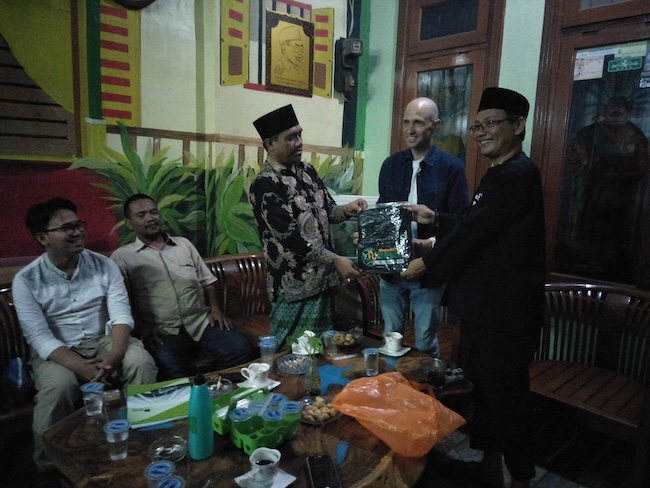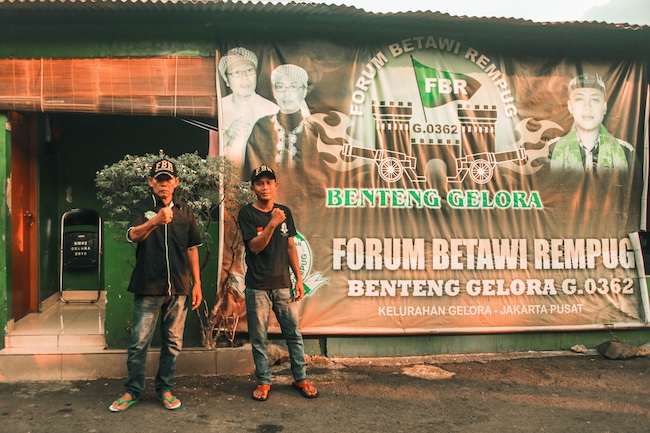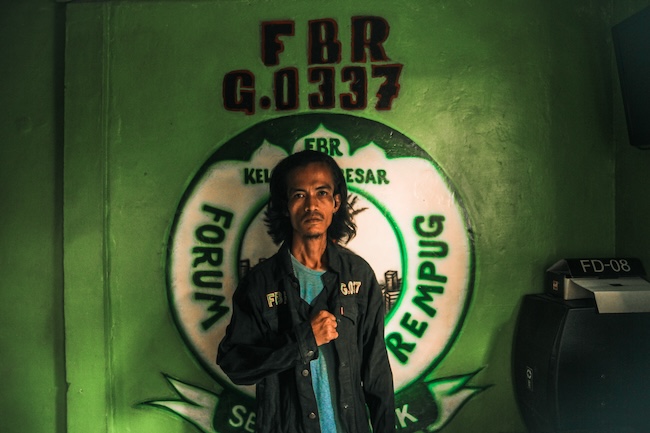Reclaiming Jakarta with the Forum Betawi Rempug
Andy Fuller
Jakarta is a contested social space; it’s a city with many nodes, centres and points of orientation. It spreads out from the well maintained centre around the Bundaran Hotel Indonesia, the luxurious shopping malls in the immediate surroundings, the upper middle-class suburbs of Menteng and nearby Cikini and, then going north, it becomes industrious and dusty and watery, while to the south it melts into the cafes and restaurants and yoga studios of Kemang and then transforms into Depok and West Java proper. If one is away from the city for a few weeks or months, let alone a few years, one can be disoriented by the changes in the city’s appearance, such is the rapidity with which new buildings pop up or the old ones are demolished. The governance and securitisation of this megacity involves the collaboration between formal and informal organisations.
Jakarta is at once the embodiment of the Great Indonesian Dream and a source of perpetual consternation, frustration and compromise. The north of the city boasts the Jakarta International Stadium, one of the most technologically advanced football stadiums in the region, but it sits unused owing to the conflict between President Widodo and his political rival, Anies Basweden. There is new public transport infrastructure including underground and light rail transport and a train to the airport, yet these services are felt to be either too infrequent, under-utilised or their routes not long enough.
As a city that has served to embody the unity and diversity of the nation, Jakarta has been imagined as a space in which people from throughout the archipelago can come to realise their dreams and become full and proper Indonesian citizens. President Widodo’s utopian dream of the Ibu Kota Nusantara in East Kalimantan has created an alternative vision of what an Indonesian urban future looks like.
Jakarta, while it has been enriched with infrastructure and capital, the indigenous people of Jakarta, the Betawi, have been steadily marginalised in the years since independence. Icons of Betawi identity range from Muhammad Husni Thamrin, a recognised national hero of Indonesia’s independence to the folk bandit, Si Pitung whose image resonates strongly with contemporary urban vigilantes who seek to regain wealth from political and economic elites. An organisation that has sought to reclaim the city (merebut kembali) has been the Forum Betawi Rempug (FBR, Betawi Brotherhood Forum). Ostensibly, they seek to ‘reclaim’ the city from ‘newcomers’ who have established businesses and made their fortunes in the city without duly employing local Betawi folk. Who ‘the Betawi’ are is not easily defined. Throughout my fieldwork, FBR and ‘Betawi’ advocates frequently pointed to other FBR members as being Sundanese or from other parts of Indonesia. It was as if advocating for a Betawi prominence in Jakarta was sufficient for making one Betawi. The FBR seek to articulate the interests of the indigenous people of Jakarta so that they can become economically empowered as both the ‘boss’ and ‘hosts’ of ‘their own’ city. For the FBR, the ongoing building of the new capital, the IKN moving in East Kalimantan represents an opportunity to reassert their cultural relevance.
Keeping watch
It is a seemingly a quiet evening by an FBR guardhouse (gardu) in northwest Jakarta. The sounds of passing motorbikes create the strongest disturbance to this gentle urban evening. I’m sitting opposite the office of the local FBR chapter by an austere raised gardu. The position, at the mouth of the narrow, connecting street, provides a view along it as well as a checkpoint from which they can monitor who comes in and out of the kampung. We’ve barely started chatting when a couple of teenage girls show up in distress: they have had their mobile phones stolen. Their phones were swiped from their hands by a pair of motorcyclists, who, no doubt, have already fled the scene. The two FBR members who are ostensibly providing security for the kampung recognise the futility in chasing after the culprits. Instead, they blame the girls for being out and about, probably on a date with their boyfriends, in a darkened area of the neighbourhood. ‘Salah sendiri,’ ‘it’s your own fault’, one of the gardu members confirms. It’s hardly a sympathetic approach to the situation. Nonetheless, some phone calls are made to others to see if anyone has noticed anything suspicious. They don’t bother to call the police, for, one of the guards tells me, even the local police rely on this FBR chapter for information and surveillance.
A couple of youths are deployed on their motorbikes to circulate through the kampung to see if anyone has noticed anything. As expected, they return with no useful information. I’m informed that despite the apparent calmness, this area is rawan (dangerous; volatile) and such incidents are commonplace.
The FBR, is a Jakarta-based vigilante group, boasting some 60,000 members. While in its earlier years, being ‘Betawi’ was essential to membership, the organisation now seeks to be more inclusive and open to any residents who have a Jakartan KTP. The FBR is one of many organisations that have emerged in the post-Reformasi era, that function as providers of security.

The post-New Order era has witnessed several interrelated factors which have allowed these groups to establish themselves within everyday urban life: an untrusted and corrupt police force and formal security apparatus, decentralisation and the strengthening of identity politics, louder and more assertive calls to follow Islamic orthodoxy and the ubiquity of social media through which hoaxes and hate speech can be spread easily. The FBR have managed to navigate a path through the changing post-New Order era in which they manage to show themselves as both working with the government (and police) while also representing Betawi and Islamic identities.
In everyday practice this ‘security provision’ means taking a cut from the large informal street economy. Nationwide, some 60 per cent of the Indonesian workforce is in the informal economy. The many locations where someone may set up street stalls, motorcycle or car parks and construction sites are contested. The street is parcelled up into fragments that need ‘guarding’ or ‘watching over’. The gardu of the FBR provide a physical marker denoting to whom a certain area (wilayah) belongs. Often on display at their security posts are pale green flags bearing the FBR logo and sporting the gardu’s specific branch number and title. Such markers send a signal to other vigilante organisations warning them against muscling in on their territory.
A basic question to be asked is whether they provide a threat or a kind of protection in urban kampungs. Wilson regards them as a racketeering organisation: in which they protect business owners from threats made by other vigilante organisations. In my interviews, my informants shared with me how establishing a position within FBR helped them obtain informal work and to feel connected with others. Although there were often general comments about Islamic or Betawi norms, people articulated their reasons for joining in terms of jaringan (networks) and koneksi (connections). That members had oscillated between supposed rivals Pemuda Pancasila and other ormas (mass organisations) also suggests that ideology or symbolic references weren’t essential to their affiliation.
A Betawi brotherhood
There are multiple, sometimes competing narratives about what the FBR is and stands for. For some they are vigilantes, while my informants tell me they are partners of the government (mitra pemerintah; mitra tiga pilar). FBR members are defensive of their organisation’s reputation. They feel that they are unfairly represented in the media in which they often are portrayed as thugs who are prone to violence and cause more trouble than they protect others from. Members tell me about the brotherhood that is shared between them: their highly valued ‘kerempugan’, togetherness, or sense of solidarity. Informants share stories how there is almost a blind loyalty between members: if they receive a call to go and protect another member who has found himself (for indeed members are almost exclusively men) they’ll do so without question. ‘Protect’ is the common euphemism for the threat or use of violence.

A long running conflict with its rival group, Pemuda Pancasila, a nationalist vigilante organisation, provides the media with a clear framing device for representing the two organisations as demarcating nationalist and Islamic interests. My reading is that while the two organisations may clash over territory, they share many similarities. Over the last few years, the FBR’s YouTube channel has become a means through which members can self-represent their organisation. The official channel highlights the ‘contribution’ they make to their local communities, from their own perspective. The documentation of the everyday activities of the organisation reveals the incorporation of nationalist symbols and performances into FBR identity. Arguably, this amalgamation of nationalist symbolism and performance into FBR has made the group more palatable to government and has allowed them to escape a ban, as was applied to the notorious Front Pembela Islam (Islamic Defenders Front, FPI), long considered to be ‘of a kind’ with FBR.
Piety
Sitting in an office of the FBR in Kemayoran and talking with Pak Kyai Luthfi Hakim, the long-serving leader of the FBR, one gains a different impression of how the organisation sees its mission and purpose. Pak Kyai is hardly a firebrand: unlike the notorious Habieb Riziek of FPI or even the much more confrontational founder of FBR, Kyai Fudloli. At his home in East Jakarta hangs a portrait of Gus Dur, the late and revered former president of Indonesia and head of Nadhlatul Ulama. In the style of Gus Dur, Kyai Luthfi is an enthusiastic storyteller who can articulate his views through drawing on local stories and anecdotes. Hakim makes regular visits to Mecca and is seemingly fluent in Arabic, but he is far from being a would-be Salafi seeking to purify Indonesian Islam from local traditions. Instead, he regards these diverse expressions of religiosity as something to be maintained and celebrated. Hakim maintains an Instagram account in which he features photos of himself both ‘at play’ and in conversation with notable figures from other religious organisations or from the government. He very rarely uses the account to assert the ideological position of FBR: the condemnation of flying the rainbow flag at the British embassy was such an exception, as well as his criticism of the Minister of Religion for his comments about the adzan in early 2022. The portrait of Hakim represented through his social media account, is that of a leader who is comfortable being Betawi, a devout Muslim and an avowed nationalist, who is willing to work with both governmental figures and the police. ‘FBR itu, adalah mitra pemerintah’, he reminds me while we consume our durian bought from a nearby stall. ‘We are partners with the government.’
The FBR can be regarded as a symptom of Jakarta’s unequal development. Infrastructure is unevenly distributed, as are services provided by the government. The gaps in the city’s infrastructure and services leaves space for semi-formal organisations to act as go-betweens between the government (pemerintah) and society (masyarakat). The FBR consolidates and strengthens its position through drawing on Betawi and Islamic symbols. In order to mobilise their members into performing demonstrations the organisation frequently refers to the affronts to both Betawi legitimacy as the indigenous people of Jakarta, as well as affronts to Islamic norms. From the perspectives of FBR informants, they act as ‘partners with the government’ and who provide ‘security’ on the city’s streets. For those who have to fork-out pungli (informal taxes) they are thugs who need to be placated and who provide yet another kind of threat.
Andy Fuller (fuller.andy@gmail.com) is a postdoctoral research fellow at Utrecht University and founder of Reading Sideways Press.












